 MyDogBreeds
MyDogBreedsBoykin Spaniel is originated from United States but Australian Cattle Dog is originated from Australia. Both Boykin Spaniel and Australian Cattle Dog are having almost same height. Both Boykin Spaniel and Australian Cattle Dog are having almost same weight. Both Boykin Spaniel and Australian Cattle Dog has almost same life span. Both Boykin Spaniel and Australian Cattle Dog has same litter size. Boykin Spaniel requires Moderate maintenance. But Australian Cattle Dog requires Low maintenance
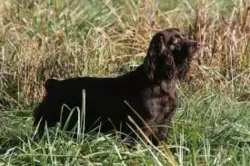 The Boykin Spaniel was originally bred by South Carolina hunters as the perfect dog for hunting wild bird during the early 1900s. Alexander White of Spartanburg found a short, well built dog and named him Dumpy. The dog was given to a certain L. Whitaker Boykin and a similar dog in looks was found and mated with Dumpy on Boykin’s Pine Grove plantation. Whitaker Boykin was particularly looking for a special kind of hunting dog breed that could wade into swamplands and into water.
The Boykin Spaniel was originally bred by South Carolina hunters as the perfect dog for hunting wild bird during the early 1900s. Alexander White of Spartanburg found a short, well built dog and named him Dumpy. The dog was given to a certain L. Whitaker Boykin and a similar dog in looks was found and mated with Dumpy on Boykin’s Pine Grove plantation. Whitaker Boykin was particularly looking for a special kind of hunting dog breed that could wade into swamplands and into water.
Boykin’s spaniels were popular in South Carolina before World War II and later, in 1977, the Boykin Spaniel Society was founded to ensure the breeding standards of the dog. In 1985, the Boykin Spaniel was declared the state dog of South Carolina and recognized by the American Kennel Club in 2009.
During the 19th century, in the New South Wales, lived a cattle farmer Thomas Hall. He wanted to have a perfect cattle dog so he mixed two breeds: dogs used by stockman with the dingo. The new breed was given an interesting name - Halls Heelers. Heelers was a part of the dog breed because this new breed of the dog inherited the nipping instinct. As time passed, one breed was developing in two breeds: the Australian Cattle Dog and the Australian Stumpy Tail Cattle Dog.
The Australian Cattle dog can be found in two available colours: red and blue. This is how they got their nicknames: Red Heeler and Blue Heeler.
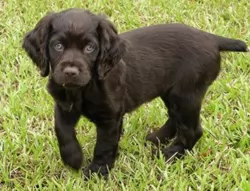 You can’t miss the medium-sized Boykin Spaniel with his magnificent coat in different shades of brown. When he gleams in the sun he looks like chocolate. This type of Spaniel is a bit bigger than the English Cocker Spaniel, but he is heavier, weighing between 13 to 18kg. He has large, floppy feathery ears and the tail has always been docked to give him that distinct look, but now with rules and regulations, the tail is often left so that it is long and feathery. The height of this dog at the withers is 39 to 43cm.
You can’t miss the medium-sized Boykin Spaniel with his magnificent coat in different shades of brown. When he gleams in the sun he looks like chocolate. This type of Spaniel is a bit bigger than the English Cocker Spaniel, but he is heavier, weighing between 13 to 18kg. He has large, floppy feathery ears and the tail has always been docked to give him that distinct look, but now with rules and regulations, the tail is often left so that it is long and feathery. The height of this dog at the withers is 39 to 43cm.
The length of the dog’s coat varies somewhat because of the different breeds from the past. Essentially the coat is medium length and wavy to curly with light feathering around the legs, ears, chest and stomach.
The Boykin Spaniel is social and he makes an excellent family pet. He is good around children and other dogs, and with training and socialization he becomes even more amicable and obedient.
The Australian Cattle Dog originally mixed with Australian herding dog that was kept near the cattle to guide them. Medium-sized, with the short coat, this dog is generally easy to groom and maintain. It does require more brushing during the shedding period, but it is still not an everyday need. He is easy to train because he likes challenging games and activities which are. It gets very attached to its owner, and he is always protective of them and their possessions. The most common health problems happen with their ears and eyes, but they are usually very healthy and they have a long life – up to 15 years.
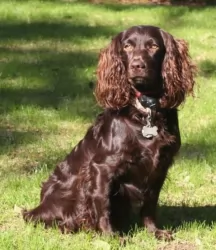 The Boykin Spaniel is a diverse breed. The characteristics of the dog aren’t set in stone. He is a hunting dogs with boundless energy and enthusiasm. He is an intelligent breed and responds well to training and is obedient to your commands. He is all about fun and excitement and he is guaranteed to make a splendid companion.
The Boykin Spaniel is a diverse breed. The characteristics of the dog aren’t set in stone. He is a hunting dogs with boundless energy and enthusiasm. He is an intelligent breed and responds well to training and is obedient to your commands. He is all about fun and excitement and he is guaranteed to make a splendid companion.
Active and social, he is going to need input from his owners in terms of exercise and mental stimulation. He isn’t a dog to just ignore and in exchange for love and care, he is going to be a loving, loyal and fun companion for you.
Children and Australian Cattle Dogs can grow up together in harmony. They will have a loyal and protective companion. After you properly train your dog and teach your child how to play with the dog, you will bring the friendship on the safe side. Some of them will have the instinct to nip at heels, so you should pay attention to this while training your pet.
Special talents: cattle dog, service dog, therapy dog, police dogs, drug detection dogs.
Australian Cattle Dogs can survive cool, hot and temperate conditions. They can live in a shelter outdoors, and they do well living indoors. But, be aware – without enough physical activity, this dog will end up being frustrated and unhappy.
They will absorb every new trick so quick that you will be amazed. They love to learn, and if you start with some good trick you will raise a great friend and maybe a great competitor in fetch, swim, bring-a-stick, or run-the-show dog sports.
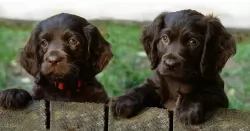 The Boykin Spaniel is a healthy breed with a life span of 14 to 16 years. There are some diseases that you want to be aware of with your Boykin Spaniel.
The Boykin Spaniel is a healthy breed with a life span of 14 to 16 years. There are some diseases that you want to be aware of with your Boykin Spaniel.
Always be aware of Hip Dysplasia as it can reduce your pet’s quality of life.. In dogs with hip dysplasia, the hip joint doesn’t to develop properly and deterioration sets in and your pet can lose function of the joint. You’ll notice your pet battling to stand up after lying down. The frightening this is that some dogs begin to show signs of hip dysplasia as early as 4 months of age.
The Boykin Spaniel’s most common health problems apart from hip dysplasia are patellar luxation and juvenile cataracts.
Health Problems: are mostly inherited. You can avoid this by searching for a good breeder that can clear out the hereditary diseases.
The Australian Cattle Dog is one of the breeds that can be born with progressive retinal atrophy. Progressive rod-cone degeneration is a disease that causes the rods and cones in the retina of the eye to degenerate. It might lead to blindness.
The Australian Cattle Dog is one of the rare breeds with recessive piebald alleles. This gene is the reason why they have white colour on their coat. But, unfortunately, this gene can be the reason why congenital hereditary deafness develops.
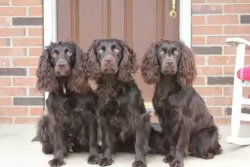 The Boykin Spaniel has been a gun dog and because he is energetic, he will need plenty of exercise and activities. Take him for walks or allow him to swim in the farm dam if you live in the country. He isn’t a dog to leave on his own in your backyard as he needs exercise as well as mental stimulation to keep him from becoming frustrated and developing destructive habits.
The Boykin Spaniel has been a gun dog and because he is energetic, he will need plenty of exercise and activities. Take him for walks or allow him to swim in the farm dam if you live in the country. He isn’t a dog to leave on his own in your backyard as he needs exercise as well as mental stimulation to keep him from becoming frustrated and developing destructive habits.
The Boykin’s hair will need to be brushed as least twice a week to prevent it from matting, particularly if he is a country-living dog, in and out of water and running through long grass. He is not a heavy shedder but his shedding is seasonal. As a long eared dog, he will need to have his ears checked to prevent infection.
Other grooming habits to get used to with your Boykin Spaniel are having his nails trimmed and brushing his teeth at least 2 or 3 times a week with special dog toothpaste and brush.
Boykin Spaniel owners who know the breed well say that there is nothing better than feeding your dog raw meat with vegetables and rice. Of course, not everyone can afford to feed their pets raw meat every day, and that’s alright. Just make sure that every now and then you include raw meat into your pet’s diet.
The very best commercially produced dog foods can also be good for your pet. If in doubt, speak to your veterinarian about the best food for your active, energetic pet. Never, ever deprive your pet of fresh, cool water throughout the day and night.
Herding dog have a history of the joint diseases. That’s why some of the pet suggest feeding a herding dog with meat like chicken, turkey, beef, lamb and fish. Dry dog food, even premium quality, may not be enough for this energetic dogs and their bone structure. But it depends on the dog. The best advice is to always take an advice from your breeder or your wet.
You won’t be very busy with grooming your Australian cattle dog. You don’t have to take everyday care of it. Occasional brushing will be more than enough. Bath the dog only when you notice odour problem.
The Australian Cattle Dog needs a high level of activity. Like many other herding dog breeds, they love walks, spending time with people, running or doing any athletic sports with them, teaching them tricks since they have above average intelligence. Fetching will be super fun for everyone, agility, competitions or any other challenging activity. They love water and they swim very well so you can take the dog with you to the nearest pool and have a great time.